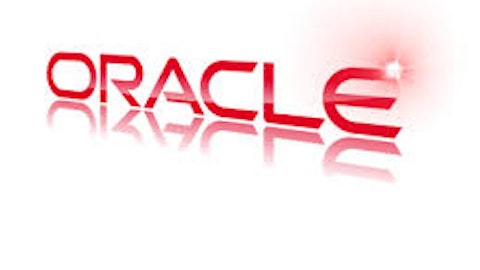Google Inc (NASDAQ:GOOG) is working on an Android video game console, according to a report from the Wall Street Journal. The news comes as a surprise, but is certainly not implausible.
Right now, there are at least four Android-based gaming devices in the works or on sale. And given the obvious demand, it only makes sense for Google to capitalize on the trend.
What could this mean for the video game industry? And what does it say about Google Inc (NASDAQ:GOOG)’s war with Apple Inc. (NASDAQ:AAPL)?
A wave of Android consoles
As I wrote earlier in the week, Android is slowly becoming a force in the video game industry. The Android-based, Kickstarter smash hit Ouya went on sale Tuesday (it has already sold out), while NVIDIA’s handheld SHIELD is expected to arrive in stores next month. There are two other Android-based consoles also in the works — Mad Catz’s Project MOJO and the GameStick.
Broadly speaking, the appeal of these devices seems to be the price. The Ouya costs only $99, and all games are partially free-to-play. The GameStick comes in at even less — just $79, while Mad Catz is reportedly targeting a similar price for Project MOJO.
NVIDIA’s SHIELD is the outlier here at $300, but includes unique, PC-streaming functionality.
In general, consumers spend a significant amount of time on their smartphones and tablets playing games. As Android has become increasingly popular, the number of games developed for the platform has likewise grown.
But as gamers know, using a touch screen is far from ideal. Given the low-cost nature of Android, and the plethora of games already available, the appeal of an Android console seems like a given.
Android’s fragmentation
The problem with Android is its fragmentation. Unlike Apple Inc. (NASDAQ:AAPL)’s iOS, Google freely gives Android away. Consequently, there are all sorts of Android devices out there — Android smartphones and tablets can be found in practically every size and at every price range.
This has lead to Android’s market share dominance, but has created a challenge for developers. Making games for Android can be a nightmare; a game that works on one phone or tablet might not work on another.
The rise of these alternative Android-based consoles should only add to the fragmentation. In addition to having unique controllers, the Ouya and GameStick also have unique game stores — they don’t have direct access to Google Inc (NASDAQ:GOOG) Play.
Making its own console, then, makes sense for Google. If these other Android consoles were to gain critical mass — and attract hordes of game creators — Google Inc (NASDAQ:GOOG) would be losing out on potential revenue, while bolstering Android’s fragmentation. Google gets a cut of the software sold on Google Play; it gets no such cut from the sale of Ouya games.
Is an Apple console in the works?
Interestingly, The Wall Street Journal mentions that Google Inc (NASDAQ:GOOG) may be developing its console to counter a similar move from Apple Inc. (NASDAQ:AAPL). This begs the question: is Apple about to break into console gaming?
It would make sense. One of the creators of the original Xbox, Nat Brown, wrote a blog post back in February in which he laid out the case for Apple’s potential video game dominance.
Brown argued that the app store model was highly appealing to developers. If Apple Inc. (NASDAQ:AAPL) was to bring iTunes to the TV via a souped-up Apple TV set-top box, or full-fledged TV, it could dominate the console gaming market.
Apple’s update to iOS 7 includes support for third-party controllers, and the Cupertino tech giant is widely believed to working on some kind of TV. While Google Inc (NASDAQ:GOOG) might beat Apple Inc. (NASDAQ:AAPL) to the console market, the Mac-maker probably won’t be far behind.
GameStop’s uncertain future
GameStop Corp. (NYSE:GME) shares first tumbled, then rallied, on Microsoft Corporation (NASDAQ:MSFT)’s Xbox One policy. The Xbox One was poised to be a console antagonistic to used games. Selling and trading games was going to be possible, but difficult.
Fortunately for GameStop Corp. (NYSE:GME), Microsoft Corporation (NASDAQ:MSFT) crumbled under consumer pressure and went back on its stated limitations. Given that GameStop is heavily dependent on the sale of used games, any restrictions placed on this market would be devastating to the company.
However, GameStop’s future remains far from certain. While the traditional console makers may continue to bring it business, the rise of alternative consoles is definitely a threat. The Android-based consoles out there right now are fully digital; consoles from Google and Apple would likely be fully digital as well.
Any GameStop Corp. (NYSE:GME) investors should keep a close eye on the popularity of these new consoles. If they steal market share from the traditional console makers, GameStop could be in for a challenge.
2013: the year of the video game console
This year, both Sony Corporation (ADR) (NYSE:SNE) and Microsoft Corporation (NASDAQ:MSFT) will launch their next generation consoles. And while most might view these devices as the future of gaming, that might not be the case.
Ultimately, the future of gaming could lie with Google Inc (NASDAQ:GOOG) and Apple Inc. (NASDAQ:AAPL). iOS and Android are already incredibly popular mobile gaming platforms — is the living room next?
Sam Mattera is long GameStop puts dated January 2015. The Motley Fool recommends Apple and Google. The Motley Fool owns shares of Apple Inc. (NASDAQ:AAPL), GameStop Corp. (NYSE:GME), and Google Inc (NASDAQ:GOOG).
The article Google Is About to Completely Change the Video Game Industry originally appeared on Fool.com.
alvatore “Sam” is a member of The Motley Fool Blog Network — entries represent the personal opinion of the blogger and are not formally edited.
Copyright © 1995 – 2013 The Motley Fool, LLC. All rights reserved. The Motley Fool has a disclosure policy.






